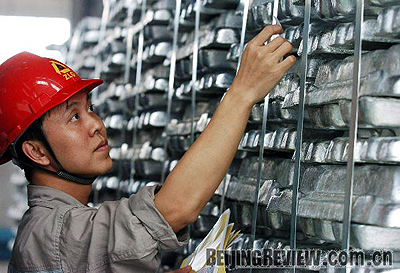|

China's largest aluminum company, the Aluminum Corp. of China (Chinalco), stunned the market when it teamed up with the U.S. aluminum producer Alcoa to buy a 12-percent stake in iron ore giant Rio Tinto's London-listed stock. The share raid was launched less than a week before BHP Billiton was expected to sweeten its takeover bid for Rio.
The transaction was completed through Chinaco's wholly owned subsidiary, Singapore-based company Shining Prospect Pte Ltd. on February 1. The total price of the acquisition stood at $14.05 billion, into which Alcoa has committed only $1.2 billion. It is the largest overseas investment ever made by a Chinese enterprise.
As the world's second largest alumina producer, Chinalco has total assets of more than 200 billion yuan ($27.8 billion), gaining over 130 billion yuan ($18 billion) in turnover last year and more than 20 billion yuan ($2.8 billion) in profits for two consecutive years.
The China Development Bank is in charge of financial arrangements for Chinalco, while Lehman Brothers and the China International Capital Corp. Ltd. provides financial consulting, according to Lu Youqing, Deputy General Manager of Chinalco.
This is the largest-ever stock trading case in value worldwide, said Yang Zhizhong, Chairman of the investment bank Lehman Brothers China.
Earlier last November, the British-Australian joint venture mining group, BHP Billiton, made an informal proposal to buy Rio, offering three of its shares for every Rio share. Rio rejected the proposal as too low and asked BHP to formalize the offer in what would be the world's biggest takeover in the mining sector, or declare the deal dead by February 6.
The 12-percent stake Chinalco and Alcoa acquired in Rio's London-listed stock, however, only translates into a 9-percent stake in the whole group, short of the 10 percent necessary to completely block a takeover bid. Rio Tinto, the world's third largest iron ore producer, is the combination of British-listed Rio Tinto PLC and Australian-listed Rio Tinto Ltd.
The share raid was deemed as a very clever strategy for Alcoa and Chinalco-Chinese enterprises have drawn lessons from many failed overseas acquisitions in which they were inclined to seek for a controlling stake.
"This unsolicited development, of which we had no prior notice, reinforces our view of the long-term value of Rio Tinto," said Rio Tinto Chairman Paul Skinner, believing the stake purchase reinforced their position that the current proposal from BHP undervalued Rio.
Also, it increased the difficulties for BHP to sweeten its bid and stoked speculation that this move might have been prompted by the Chinese Government to block a takeover amid concerns about a lessening of competition and stronger pricing control by the merged entity.
Merger uncertainty
There have been frequent acquisitions and mergers in the international mining market since 2002. In 2006, for example, there were four cases of acquisitions worth over $10 billion between large mining companies. Currently, the world's top 10 mining companies control 70 percent of the iron ore, 80 percent of the stannum, 75 percent of the copper, 58 percent of the gold and 57 percent of the zinc production in Western countries.
BHP Billiton, already the world's largest diversified mining company, and Rio Tinto, the third largest, have eyed, respectively, Alcoa Inc. and Canada's largest aluminum company, Alcan Inc., since earlier 2007. Late last year, BHP made public its informal bid worth around $140 billion. If successful, the deal would create a mining behemoth that would control almost 40 percent of the world's iron ore production. The proposal had steel makers in Asia and Europe on edge and has met with stiff opposition.
At present, the world's three major iron ore producers-BHP, Rio and the Brazilian mining company CVRD, or Companhia Vale do Rio Doce-take up more than 72 percent of all global iron ore trade. In copper production, the world's largest producer is Chile's Codelco, and the second largest is BHP, whose Escondida mine in Chile surpassed Codelco in production in the first quarter of last year. The third largest is Rio. It is still possible for Alcoa, Alcan, Rio and BHP to merge into one entity to control over 50 percent of global aluminum production.
"It's terrible," said Liu Yikang, Deputy Secretary General of China Mining Association. "If completed, the deal between Rio and BHP would create a mining giant enjoying a monopoly in many mineral resources and a further lessening of competition, and would thus lead to hikes in iron ore prices."
"A far more critical issue is the inevitable rise in prices this merger would bring following such an elimination of competitive choice," said Ian Christmas, Secretary-General of International Iron and Steel Institute, in response to the proposal. "This merger is not in the public interest and should not be allowed to proceed."
| 